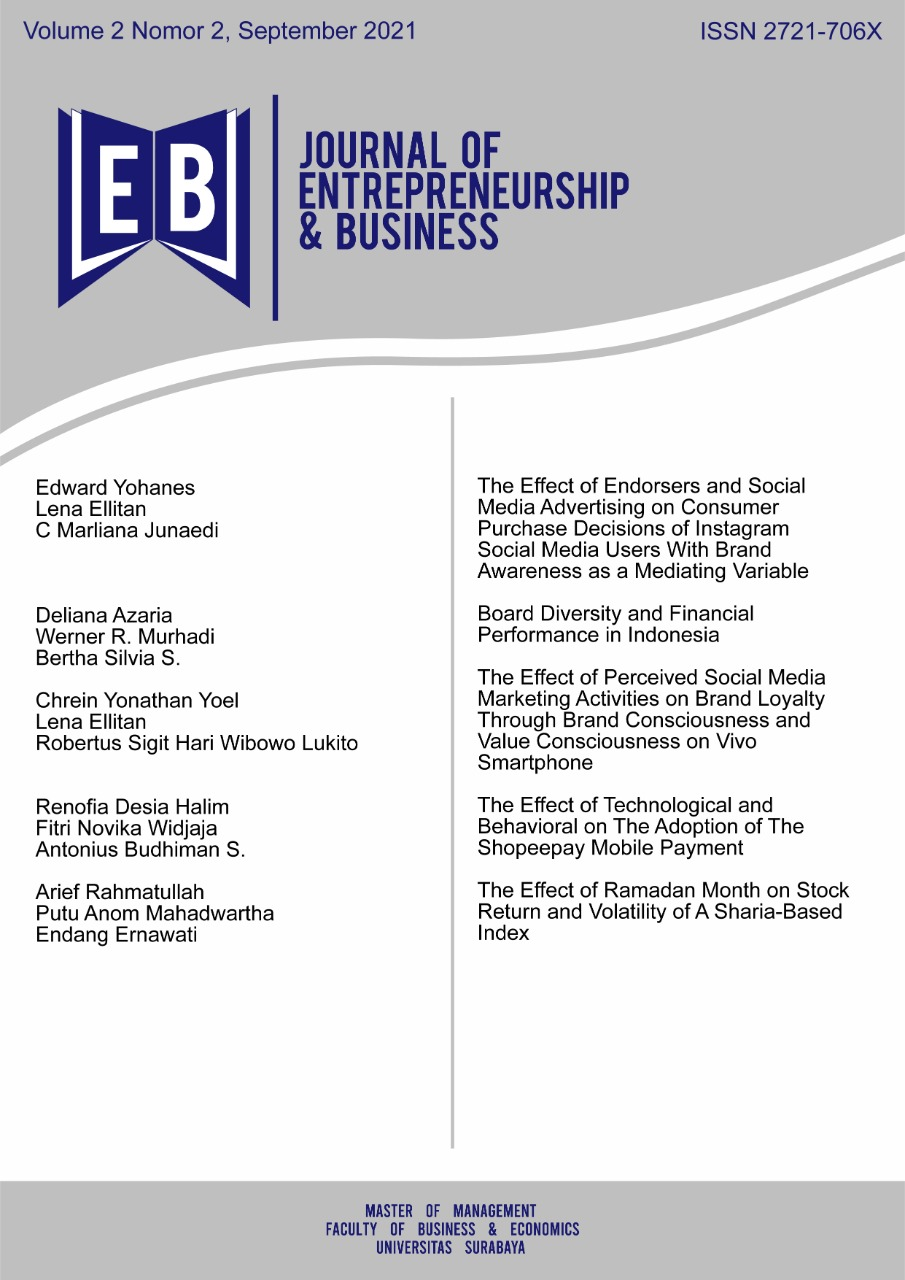Board Diversity and Financial Performance in Indonesia
 Abstract Views:
1575 times
Abstract Views:
1575 times
 PDF Downloads:
760 times
PDF Downloads:
760 times
Abstract
Corporate governance has attracted many researchers to examine the relationship between board characteristics and financial performance. This study aims to determine the effect of board diversity, board size, and board independence on financial performance. This research is panel data with the number of observations reaching 1,355 years of observation. Financial performance is measured using accounting-based and market-based. It was found that the presence of female directors could not provide sound financial performance, even with a woman's prudence attitude would have an impact on decreasing the company's market value. The size of the board of directors does not affect financial performance, and the large size of the board of directors will have an impact on the decline in firm value. Independent directors are also not proven to be able to improve the company's financial performance; even the tendency of companies to carelessly fulfill the provisions of the rules regarding the existence of independent directors will bring a burden to the company so that it has an impact on the decline in company value.
Downloads
References
Adams, R. B., & Ferreira, D. (2009). Women in the boardroom and their impact on governance and performance. Journal of Financial Economics, 94(2), 291–309.
Assenga, M. P., Aly, D., & Hussainey, K. (2018). The impact of board characteristics on the financial performance of Tanzanian firms. Corporate Governance: The International Journal of Business in Society, 18(6), 1089–1106. Retrieved from https://dx.doi.org/10.1108/CG-09-2016-0174
Bhagat, S., & Bolton, B. (2019). Corporate governance and firm performance: The sequel. Journal of Corporate Finance, 58, 142–168. Retrieved from https://doi.org/10.1016/j.jcorpfin.2019.04.006
Bhatt, R. R., & Bhattacharya, S. (2015). Board structure and firm performance in Indian IT firms. Journal of Advances in Management Research.
Campbell, K., & Mínguez-Vera, A. (2008). Gender diversity in the boardroom and firm financial performance. Journal of Business Ethics, 83(3), 435–451.
Dwidjaja, S. P., Murhadi, W. R., & Utami, M. (2017). Factors Affecting the Capital Structure and Effect on Its Performance. 14th International Symposium on Management (INSYMA 2017), 1–10. Retrieved from http://repository.ubaya.ac.id/id/eprint/29061
Ferrer, R. C., & Banderlipe II, M. R. S. (2012). The influence of corporate board characteristics on firm performance of publicly listed property companies in the Philippines. Academy of Accounting & Financial Studies Journal, 16(4).
Francoeur, C., Labelle, R., & Sinclair-Desgagné, B. (2008). Gender diversity in corporate governance and top management. Journal of Business Ethics, 81(1), 83–95.
Fulgence, S. E. (2014). Corporate governance in Tanzania. In Corporate governance (pp. 157–185). Springer.
Gunawan, C. C., Murhadi, W. R., & Utami, M. (2019). No TitleA study on the effects of good corporate governance – gender diversity on the company performance. 16th International Symposium on Management (INSYMA 2019), 32–35. https://doi.org/https://dx.doi.org/10.2991/insyma-19.2019.9
Haniffa, R., & Hudaib, M. (2006). Corporate governance structure and performance of Malaysian listed companies. Journal of Business Finance & Accounting, 33(7‐8), 1034–1062.
Kılıç, M., & Kuzey, C. (2019). The effect of corporate governance on carbon emission disclosures. International Journal of Climate Change Strategies and Management, 11(1), 35–53. Retrieved from https://dx.doi.org/10.1108/IJCCSM-07-2017-0144
Koji, K., Adhikary, B. K., & Tram, L. (2020). Corporate Governance and Firm Performance: A Comparative Analysis between Listed Family and Non-Family Firms in Japan. Journal of Risk and Financial Management, 13(9), 215.
Lagos Cortés, D., Betancourt Ramírez, J., & Gómez Betancourt, G. (2018). Relationship between corporate governance, family control and financial performance in colombian companies. Innovar, 28(69), 85–98.
Lückerath-Rovers, M. (2013). Women on boards and firm performance. Journal of Management & Governance, 17(2), 491–509.
Malik, M. S., & Makhdoom, D. D. (2016). Does corporate governance beget firm performance in fortune global 500 companies? Corporate Governance, 16(4), 747–764. Retrieved from https://dx.doi.org/10.1108/CG-12-2015-0156
Murhadi, W. R., Tanugara, F., & Sutejo, B. S. (2018). The influence of good corporate governance on financial distress. Proceedings of the 15th International Symposium on Management (INSYMA 2018), 76–79. https://doi.org/https://dx.doi.org/10.2991/insyma-18.2018.19
Ntim, C. G., Lindop, S., Osei, K. A., & Thomas, D. A. (2015). Executive compensation, corporate governance and corporate performance: A simultaneous equation approach. Managerial and Decision Economics, 36(2), 67–96.
Palaniappan, G. (2017). Determinants of corporate financial performance relating to board characteristics of corporate governance in Indian manufacturing industry. European Journal of Management and Business Economics, 26(1), 67–85. Retrieved from https://dx.doi.org/10.1108/EJMBE-07-2017-005
Shleifer, A., & Vishny, R. W. (1997). A survey of corporate governance. The Journal of Finance, 52(2), 737–783.
Tricker, R. I. (2012). The cultural dependence of corporate governance. Keeping Good Companies, 64(1), 27–31.

This work is licensed under a Creative Commons Attribution 4.0 International License.
Articles published in Journal of Entrepreneurship & Business are licensed under a Creative Commons Attribution 4.0 International (CC BY) license. You are free to copy, transform, or redistribute articles for any lawful purpose in any medium, provided you give appropriate credit to the original author(s) and the journal, link to the license, and indicate if changes were made.
Authors submitting to this journal agree to make their work freely available under the CC BY 4.0 license, ensuring broad dissemination and reuse. The full license details can be accessed at https://creativecommons.org/licenses/by/4.0/.
This ensures that they receive the maximum dissemination because there are no barriers to access. This license allows readers to disseminate and reuse the paper, but always requires them to grant the authors and the first publication full credit.
While JEB upholds ethical publishing standards, the responsibility for ensuring originality and compliance with copyright regulations lies with the authors. The journal is not liable for any legal claims related to the content of published articles.
For further inquiries, please contact the editorial team.

 DOI:
DOI:











